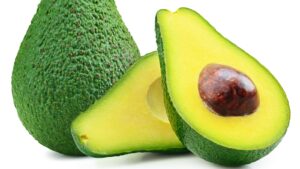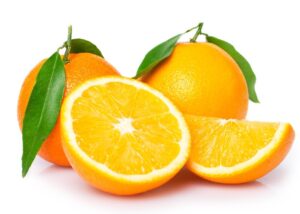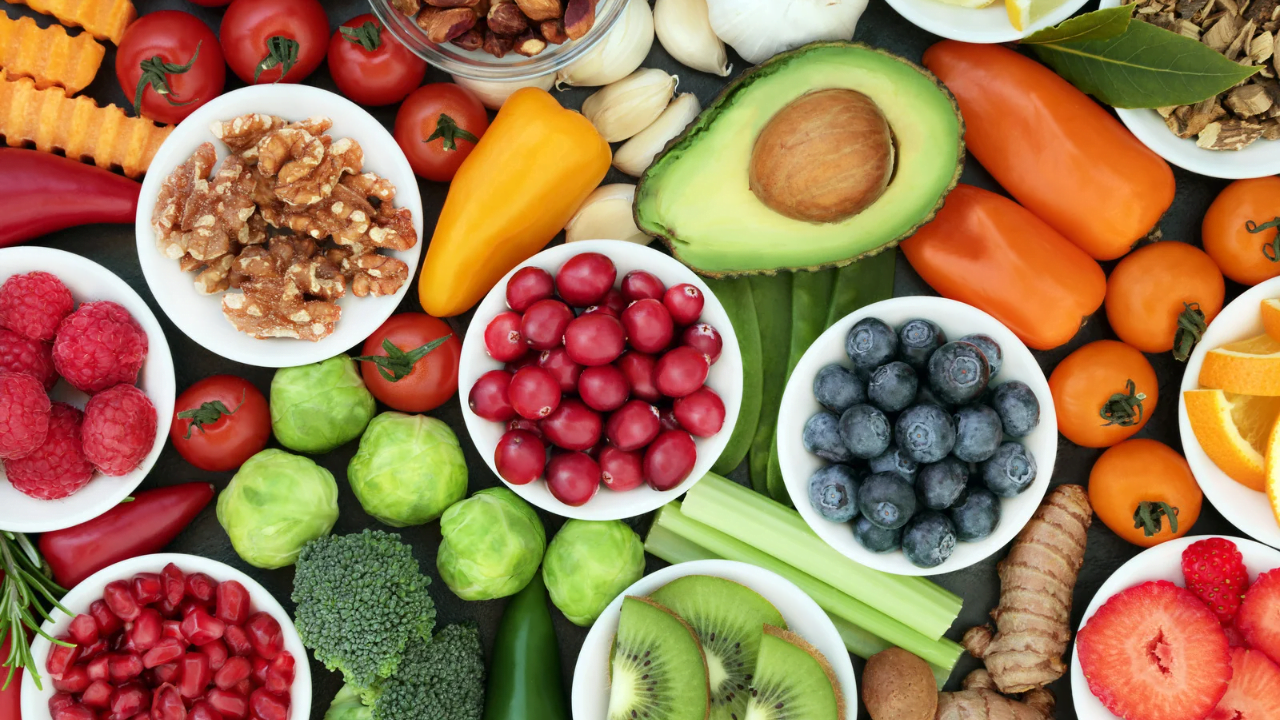Consuming a diverse range of healthy foods such as fruits, vegetables, nuts, seeds, and lean proteins can contribute significantly to maintaining your overall well-being.
Numerous delectable options exist among nutritious foods. By incorporating fruits, vegetables, high-quality protein sources, and whole foods onto your plate, you’ll create meals that are not only vibrant and adaptable but also beneficial for your health.
Below are 50 delectable and healthful choices to incorporate into your diet.
1–6: Fruits and berries
Fruits and berries are invaluable contributors to maintaining optimal health due to their rich array of vitamins, minerals, and antioxidants. These natural wonders offer a plethora of benefits, including boosting the immune system, promoting heart health, and aiding in digestion. Their high fiber content supports digestive regularity and helps control blood sugar levels, making them particularly beneficial for individuals managing conditions like diabetes. Additionally, the antioxidants found in fruits and berries help combat oxidative stress and inflammation, reducing the risk of chronic diseases such as cancer and Alzheimer’s. Incorporating a variety of colorful fruits and berries into your diet provides a delicious and nutritious way to support overall health and well-being.
1. Apples

Apples are renowned for their exceptional health benefits, earning them the well-deserved reputation of being a superfood. Packed with essential nutrients like fiber, vitamin C, and various antioxidants, apples contribute to improved digestion, boosted immunity, and enhanced cardiovascular health. The soluble fiber found in apples helps regulate cholesterol levels and promotes a healthy gut by nourishing beneficial gut bacteria. Moreover, their antioxidant content, including flavonoids and polyphenols, plays a crucial role in reducing inflammation and lowering the risk of chronic diseases such as heart disease and type 2 diabetes. Incorporating apples into your daily diet not only adds a delightful crunch but also serves as a simple yet powerful way to support your overall well-being.
2. Avocados

Avocados are prized for their remarkable health benefits, making them a staple in nutritious diets worldwide. Rich in heart-healthy monounsaturated fats, avocados contribute to lowering bad cholesterol levels while promoting good cholesterol, thus supporting cardiovascular health. Additionally, they are packed with an array of essential nutrients such as potassium, vitamin K, folate, and vitamin E, all of which play vital roles in maintaining optimal health. Avocados are also a great source of fiber, aiding in digestion and promoting a feeling of fullness, which can assist in weight management. Moreover, the antioxidants found in avocados help combat oxidative stress and inflammation, reducing the risk of chronic diseases like diabetes and certain cancers. Whether sliced onto toast, blended into smoothies, or used as a creamy topping, incorporating avocados into your diet offers a delicious and nutritious way to nourish your body and support overall well-being.
3. Bananas

Bananas are renowned for their numerous health benefits, making them a popular choice for inclusion in balanced diets. Rich in essential vitamins and minerals, bananas provide a natural source of energy, thanks to their high carbohydrate content, particularly in the form of easily digestible sugars such as glucose, fructose, and sucrose. Additionally, bananas are loaded with potassium, an electrolyte crucial for maintaining proper fluid balance, muscle function, and heart health.
Furthermore, bananas contain significant levels of vitamin C, which supports immune function and collagen production for healthy skin. Their soluble fiber content helps regulate digestion, promoting bowel regularity and alleviating constipation. Bananas also contain antioxidants such as dopamine and catechins, which help combat oxidative stress and inflammation, reducing the risk of chronic diseases like heart disease and certain cancers.
Moreover, the high levels of vitamin B6 found in bananas contribute to brain health by supporting neurotransmitter synthesis, which aids in mood regulation and cognitive function. Whether eaten as a convenient snack, blended into smoothies, or added to oatmeal or baked goods, incorporating bananas into your diet offers a delicious and nutritious way to boost overall health and well-being.
4. Blueberries

Blueberries are celebrated for their exceptional health benefits, earning them the title of a superfood. Bursting with nutrients and antioxidants, these small berries pack a powerful punch when it comes to supporting overall health. Blueberries are particularly rich in flavonoids, specifically anthocyanins, which give them their vibrant color and contribute to numerous health benefits. These antioxidants help combat oxidative stress, reduce inflammation, and protect against chronic diseases such as heart disease, diabetes, and certain types of cancer.
Furthermore, blueberries are a good source of dietary fiber, which supports digestive health and helps regulate blood sugar levels. They also contain vitamin C, vitamin K, and manganese, all of which play essential roles in maintaining various bodily functions, including immune function, bone health, and nutrient metabolism.
Studies have shown that regularly consuming blueberries may improve cognitive function, including memory and decision-making skills, due to their potential to enhance brain health and reduce age-related cognitive decline. Whether enjoyed fresh, frozen, or incorporated into various dishes such as smoothies, yogurt, or salads, blueberries offer a delicious and nutritious way to boost overall health and well-being. With their delightful taste and impressive nutritional profile, blueberries are an excellent addition to any diet seeking to prioritize health and vitality.
5. Oranges

Oranges are not only a tasty and refreshing fruit but also offer a wealth of health benefits. Rich in vitamin C, oranges are renowned for their immune-boosting properties, helping to protect against infections and promoting overall well-being. Additionally, oranges contain fiber, which aids digestion, supports gut health, and helps regulate blood sugar levels. The combination of vitamins, minerals, and antioxidants found in oranges also contributes to heart health by reducing inflammation, lowering cholesterol levels, and supporting healthy blood pressure.
Furthermore, oranges are a good source of potassium, an electrolyte that helps maintain proper fluid balance, nerve function, and muscle contraction. Consuming oranges may also aid in skin health, as vitamin C plays a vital role in collagen production, promoting skin elasticity and reducing signs of aging.
Whether enjoyed as a snack, juiced, or incorporated into salads and desserts, oranges offer a delicious and convenient way to enhance your diet and promote overall health. With their refreshing flavor and impressive nutritional profile, oranges are a versatile fruit that can be enjoyed year-round as part of a balanced and wholesome lifestyle.
6. Strawberries

Strawberries are not only a delight to the taste buds but also pack a powerful nutritional punch, earning them a spot as a beloved fruit in healthy diets. These vibrant berries are loaded with essential vitamins, minerals, and antioxidants, making them a valuable addition to any balanced eating plan. Rich in vitamin C, strawberries are renowned for their immune-boosting properties, helping to fend off illnesses and support overall health.
Moreover, strawberries are an excellent source of dietary fiber, promoting digestive health, regulating blood sugar levels, and aiding in weight management by promoting feelings of fullness. The antioxidants present in strawberries, such as flavonoids and phenolic compounds, contribute to their anti-inflammatory properties, potentially reducing the risk of chronic diseases like heart disease, cancer, and diabetes.
Furthermore, strawberries contain compounds like ellagic acid, which may help protect against oxidative damage and promote skin health by reducing signs of aging. Whether enjoyed fresh, blended into smoothies, or added to salads and desserts, strawberries offer a delicious and versatile way to boost nutrient intake and enhance overall well-being. With their sweet flavor and impressive nutritional profile, strawberries are a delightful addition to a healthy lifestyle.
Other Healthy Fruits
Additional nutritious fruits and berries encompass cherries, grapes, grapefruit, kiwi, lemons, mangoes, melons, olives, peaches, pears, pineapples, plums, and raspberries.
7. Eggs

Eggs are often hailed as a nutritional powerhouse, boasting a host of health benefits that make them a staple in many diets. Packed with high-quality protein, eggs provide essential amino acids necessary for muscle repair, growth, and overall cellular function. Furthermore, eggs are a rich source of important vitamins and minerals, including vitamin D, vitamin B12, and choline, which are crucial for bone health, nerve function, and brain development.
Contrary to previous concerns, research suggests that moderate egg consumption does not significantly impact cholesterol levels or increase the risk of heart disease in most individuals. In fact, eggs contain healthy fats and antioxidants like lutein and zeaxanthin, which promote eye health and reduce the risk of age-related macular degeneration.
Easily customizable and versatile, eggs can be prepared in various ways to suit different tastes and dietary preferences. Whether boiled, scrambled, poached, or used in baking, eggs offer a convenient and nutrient-dense option for boosting protein intake and supporting overall health. Incorporating eggs into a balanced diet can contribute to satiety, weight management, and overall well-being, making them a valuable addition to a nutritious eating plan.
Types of Eggs
There are several types of eggs available, each with its own characteristics and nutritional profiles:
Chicken Eggs: Chicken eggs are the most common type of eggs consumed worldwide. They come in various sizes and colors, including white, brown, and even blue or green (from certain breeds of chickens). Chicken eggs are versatile and can be cooked in many ways, such as boiled, scrambled, fried, or poached.
Duck Eggs: Duck eggs are larger than chicken eggs and have a richer flavor and creamier texture. They are popular in certain cuisines and are often used in baking due to their higher fat and protein content compared to chicken eggs.
Quail Eggs: Quail eggs are much smaller than chicken eggs and have a milder flavor. They are often considered a delicacy and are commonly used in Asian cuisines as well as for garnishing dishes.
Goose Eggs: Goose eggs are larger than chicken eggs and have a higher yolk-to-white ratio. They have a rich, creamy flavor and are often used in baking or as a substitute for chicken eggs in recipes.
Turkey Eggs: Turkey eggs are larger than chicken eggs but less commonly consumed. They have a similar flavor and nutritional profile to chicken eggs but are not as readily available.
Each type of egg offers its own unique taste and texture, allowing for a variety of culinary uses depending on personal preference and cultural traditions.
8–10: Meats
Lean, unprocessed meats can serve as valuable sources of essential nutrients when included in a balanced diet. These meats, such as skinless poultry, lean cuts of beef or pork, and fish, are rich in high-quality protein, which is vital for muscle growth, repair, and overall cellular function. Additionally, they provide important vitamins and minerals like iron, zinc, and B vitamins, which support various bodily processes, including energy metabolism and immune function. When prepared using healthy cooking methods such as grilling, baking, or broiling, lean meats can be enjoyed as part of a nutritious meal that promotes overall health and well-being.
8. Lean beef

Lean beef is a nutrient-rich protein source that can be a valuable component of a healthy diet. Unlike fattier cuts, lean beef contains less saturated fat and cholesterol while still providing essential nutrients such as iron, zinc, and B vitamins like B12 and niacin. These nutrients play crucial roles in supporting energy production, immune function, and red blood cell formation. Additionally, lean beef is an excellent source of high-quality protein, which is essential for muscle growth, repair, and overall cellular function. Including lean beef in moderation as part of a balanced diet can contribute to satiety, promote muscle health, and support overall well-being. Opting for lean cuts and incorporating healthy cooking methods, such as grilling or broiling, can help maximize the nutritional benefits of lean beef while minimizing added fats and calories.
9. Chicken breasts

Chicken breast is a highly nutritious and versatile protein option that can play a valuable role in maintaining a healthy diet. Known for its lean protein content, chicken breast offers essential nutrients without excess saturated fat or cholesterol, making it an excellent choice for those looking to support muscle growth and overall health. Additionally, chicken breast is rich in vitamins and minerals, including B vitamins such as niacin and vitamin B6, which are essential for energy metabolism and nerve function. Furthermore, it contains selenium, a powerful antioxidant that helps protect cells from damage and supports thyroid function.
Incorporating chicken breast into meals provides a convenient way to meet daily protein needs while offering endless culinary possibilities. Whether grilled, baked, sautéed, or added to salads and stir-fries, chicken breast can be enjoyed in a variety of flavorful and nutritious dishes. By choosing skinless, lean cuts and using healthy cooking methods, such as roasting or grilling without added oils, chicken breast can be a delicious and health-promoting addition to any balanced diet.
10. Lamb and mutton

Lamb and mutton are flavorful sources of protein that offer various health benefits when included in a balanced diet. Although they contain higher levels of saturated fat compared to leaner meats like chicken or fish, they also provide essential nutrients such as iron, zinc, and vitamin B12. Iron is crucial for oxygen transport in the blood and overall energy production, while zinc supports immune function, wound healing, and metabolism. Vitamin B12 is essential for nerve function and the production of red blood cells.
Additionally, lamb and mutton contain conjugated linoleic acid (CLA), a type of healthy fat that has been associated with reduced inflammation, improved heart health, and potential weight management benefits. Moreover, these meats are rich in high-quality protein, which is vital for muscle growth, repair, and overall cellular function.
When consumed in moderation and as part of a varied diet, lamb and mutton can be a nutritious and satisfying protein source. Opting for leaner cuts and trimming visible fat can help reduce saturated fat intake while still enjoying the health benefits of these meats. Pairing lamb or mutton with plenty of vegetables and whole grains further enhances their nutritional value and contributes to overall health and well-being.
Conclusively the Health benefits of 10 super foods are unimaginable.
In conclusion, the health benefits of incorporating fruits, berries, eggs, lamb, and mutton into one’s diet are undeniable.
Fruits and berries provide a rich source of vitamins, minerals, and antioxidants that support overall health, including immune function, heart health, and digestive health. Eggs are a versatile and nutrient-dense food, offering high-quality protein, essential vitamins, and minerals crucial for muscle growth, brain function, and cellular health.
Similarly, lamb and mutton provide valuable nutrients such as iron, zinc, and vitamin B12, along with healthy fats like conjugated linoleic acid (CLA), which offer various health benefits including improved heart health and reduced inflammation. While each food group offers unique nutritional advantages, incorporating a variety of fruits, berries, eggs, lamb, and mutton into a balanced diet can help ensure optimal health and well-being. By enjoying these foods in moderation and alongside a diverse range of other nutrient-rich foods, individuals can harness the power of nature’s bounty to support a healthy and vibrant lifestyle.
We have covered here the Super 10 Foods here. For more we will come to you soon.
